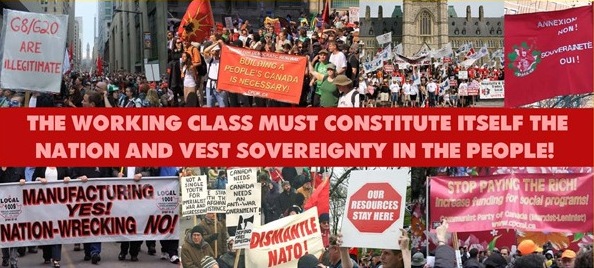
|
April 30, 2016 - No. 18 Day of Working
Class Unity and Struggle
• A Time to
Think About Concrete Solutions to the Problems May Day 2016 Day of Working Class Unity and Struggle in
|
|
The Communist Party of Canada (Marxist-Leninist) sends militant
revolutionary greetings to all the working people across the country on
the occasion of May Day 2016 as well as to the workers in all countries
demonstrating on this day. May Day is always a time to think about the
struggles the workers have waged in the past year and continue to wage
in defence of their rights and the rights of all. It is a time to raise
the demands of the workers' movement and accept the challenges the
workers face in the coming year.
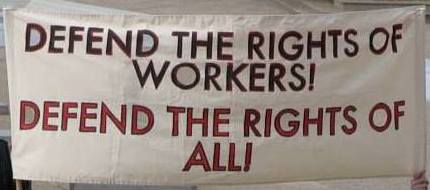 At this time in Canada and
Quebec, in all sectors of the economy, the workers and their allies
have continued valiantly to resist the anti-social offensive by
defending their rights and the rights of all. In every instance, they
have come up against the aim governments have set for society to make
the monopolies competitive on global markets, to privatize social
programs and public assets, to defraud the workers of the pensions and
benefits which belong to them by right and to put downward pressure on
wages and living standards and defame unions and those who fight. The
working class rejects with contempt these attacks and vows to redouble
its organized efforts to resist.
At this time in Canada and
Quebec, in all sectors of the economy, the workers and their allies
have continued valiantly to resist the anti-social offensive by
defending their rights and the rights of all. In every instance, they
have come up against the aim governments have set for society to make
the monopolies competitive on global markets, to privatize social
programs and public assets, to defraud the workers of the pensions and
benefits which belong to them by right and to put downward pressure on
wages and living standards and defame unions and those who fight. The
working class rejects with contempt these attacks and vows to redouble
its organized efforts to resist.
On the occasion of May Day, CPC(M-L) denounces the program of governments at all levels to pay the rich and impose decisions of a supranational nature to serve the empire-building of the U.S. imperialists abroad and wreck nation-building at home. The task is squarely before the working class to participate in nation-building against empire-building so as to open a path to progress. Far from discussing the choices the rulers and their agents put before the workers, the working class movement must take stands based on its own independent politics and build a political movement capable of achieving the objectives it sets for itself.
The working class in the twenty-first century has acquired enormous experience in defending its rights and organizing to complete the transition to modern human relations within industrial mass production. The maturity of the working class is evident in the constant organizing and struggles for its rights and in the development of its ideological and theoretical positions in opposition to those of the ruling imperialist elite.
In light of neo-liberal
restructuring of the state and
nation-wrecking, the time has arrived to open a broad front to
determine the kind of modern democracy Canada needs in the
twenty-first century. Only the workers' movement can become the
cornerstone of a renewed nation-building project to fashion a
modern democracy that empowers the people and puts control over
the economy in their hands. In opening a path forward through
organizing itself and defending its rights, the workers' movement
creates confidence that a modern democracy is possible. The
strength of the movement depends on the working class standing on
its own feet on the basis of its own independent politics and
momentum. With its head clear of all the backward and
retrogressive notions of imperialist democracy that currently
strangle all public institutions, it can take the initiative and
realize successes as well as turn successes into victory.
It is up to the working people to take up the challenge before them today which is to provide solutions which meet the needs and requirements of a society with industrial mass production as its economic base.
On May Day 2016, all across Canada and Quebec let workers together demonstrate their determination to continue their resistance to all attacks on their rights and to open a path forward to a modern democracy.
Our Security Lies in Our Fight for the
Rights of All!
Nation-Building, Yes! Empire-Building, No!
Workers and Oppressed
Peoples of All Countries, Unite!
A Time to Think About Concrete Solutions to the Problems the Workers Face
Across the country, the Communist Party of Canada (Marxist-Leninist) organizes and participates in all kinds of activities on May Day, including demonstrations, discussions, banquets and celebrations.
May Day is a day of unity and struggle which belongs to the international working class movement. As such, it is a day to stand as one to press for specific demands but is also a day to reaffirm what the workers stand for and what their struggle for their rights and the rights of all represents in the present and for the future. It is a day when fighting contingents of the working class declare what challenges they will take up for solution in the coming year.
A good start is to think about what concrete solutions can be put forward to solve the problems the workers face. For this reason, one of the most important activities the organizations of CPC(M-L) carry on the occasion of May Day is to hold discussions in which collectives of workers review the battles the workers have waged in the past year, the obstacles in their path and the challenges they must take up in the coming year.
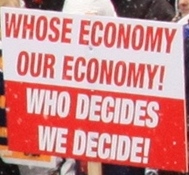 This year the working
people face difficult circumstances. In Alberta alone, 200,000 workers
have joined the ranks of Canada's more than one million unemployed
workers. Media reports indicate that 24,000 more jobs will be lost in
the energy sector before the end of this year. The cause is said to be
the crisis in the oil patch but the Workers' Opposition contests this.
The cause is the direction of the economy which is subordinate to the
aims of the international financial oligarchy and decision-making on a
supranational basis. Far from going against this direction, the
policies of the federal government are in fact making matters worse.
This is evident in its changes to the Employment Insurance regime which
are inadequate and do not provide for the people in need. How to view
this situation and what can be done about it is one of the concerns on
the minds of the workers today.
This year the working
people face difficult circumstances. In Alberta alone, 200,000 workers
have joined the ranks of Canada's more than one million unemployed
workers. Media reports indicate that 24,000 more jobs will be lost in
the energy sector before the end of this year. The cause is said to be
the crisis in the oil patch but the Workers' Opposition contests this.
The cause is the direction of the economy which is subordinate to the
aims of the international financial oligarchy and decision-making on a
supranational basis. Far from going against this direction, the
policies of the federal government are in fact making matters worse.
This is evident in its changes to the Employment Insurance regime which
are inadequate and do not provide for the people in need. How to view
this situation and what can be done about it is one of the concerns on
the minds of the workers today.
This year, May Day is marked in the context of a new federal government. How this government is dealing with the all-sided crisis with economic crisis at the base is a major concern. Are the changes it is enacting or decreeing helping to resolve the crisis in favour of the people, or a further implementation of neo-liberal agendas to find funds from social programs and workers' pension funds to pay the rich and further destroy the public authority? This agenda is implemented in the name of prosperity and the claim that when the monopolies are prosperous, the well-being of the people, society and the country are looked after. How to deal with this claim which is clearly false is also a matter of concern.
The Trudeau government has taken the reins of power at
a time when all the arrangements upon which the society in the post-war
period was based have been done away with, leading to ever greater
riches on one pole and increasing poverty on the other. Despite this
fact, the anti-social offensive and nation-wrecking are being stepped
up while the new Trudeau government speaks about ending inequality,
"growing the middle class" and consulting with the people.
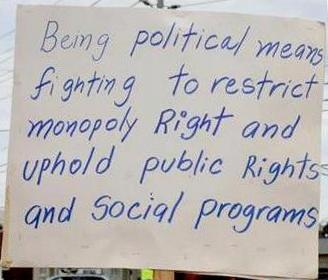 How to resist the vicious
anti-social offensive unleashed by governments at different levels in a
meaningful manner has become a very important fight, especially now
with the new Trudeau government claiming it is consulting everyone and
reversing the policies adopted by Harper such as on EI. But this
government is rapidly revealing itself to be a government which, like
the Harper government before it, is also restructuring the state to
impose monopoly interests as the aim of society. And it is going
further, streamlining measures which will criminalize the resistance
struggles at home and abroad in the name of "responsible conviction,"
its entirely self-serving concoction to fool the gullible and justify
empire-building. Under the pretext of reforms to the electoral process
and what are called the democratic institutions, the government aims to
further liquidate the vestiges of those arrangements which bind the
people to the political regime in Canada. It pushes a distinct version
of anti-politics to keep the people incapable of orienting themselves
on an informed basis to ensure that they cannot mount an effective
opposition.
How to resist the vicious
anti-social offensive unleashed by governments at different levels in a
meaningful manner has become a very important fight, especially now
with the new Trudeau government claiming it is consulting everyone and
reversing the policies adopted by Harper such as on EI. But this
government is rapidly revealing itself to be a government which, like
the Harper government before it, is also restructuring the state to
impose monopoly interests as the aim of society. And it is going
further, streamlining measures which will criminalize the resistance
struggles at home and abroad in the name of "responsible conviction,"
its entirely self-serving concoction to fool the gullible and justify
empire-building. Under the pretext of reforms to the electoral process
and what are called the democratic institutions, the government aims to
further liquidate the vestiges of those arrangements which bind the
people to the political regime in Canada. It pushes a distinct version
of anti-politics to keep the people incapable of orienting themselves
on an informed basis to ensure that they cannot mount an effective
opposition.
In this regard, today the fight between the Old and the New is a manifestation of the class struggle between the ruling elite to disempower the working class and people so as to impose their dictate without opposition, and the working class and people who seek to build a bright future for themselves and the coming generations. This presents particular challenges which must be addressed. The aim of the Workers' Opposition and Marxist-Leninists in addressing these challenges is not to bemoan our fate but to arm ourselves so that we can see how to open a path for society's progress and avert the grave dangers of fascism at home and war abroad which face us at this time.
How to defend the rights of the working people within a
situation where negotiations to determine working conditions and wages
as well as employer-employee relations have been replaced with dictate
from above, often on an international level, is a constant concern. So
too is the fact that the political parties have been systematically
destroyed. They no longer operate as primary political organizations
which connect the broad masses of the people with the political power
and governance but have been converted into official state institutions
and formed a mafia-style cartel party system which maintains privileges
and keeps the people disempowered. The Trudeau government is taking
this much further with its proposals to restrict organizations'
political spending and reform the Liberal Party itself so that it no
longer has any members which can hold its leadership to account.
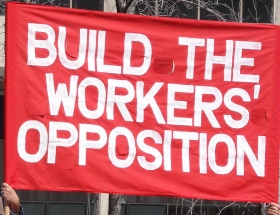 Discussing these matters is
necessary to orient the workers' movement. It must ensure that the
movements of the peoples in defence of their rights are not disinformed
and liquidated with the new regime which opposes the people having any
political role whatsoever.
Discussing these matters is
necessary to orient the workers' movement. It must ensure that the
movements of the peoples in defence of their rights are not disinformed
and liquidated with the new regime which opposes the people having any
political role whatsoever.
The Workers' Centre of CPC(M-L) is at the disposal of all working people across the country to smash the silence on the workers' working and living conditions today and on the resistance struggles they are waging. Developing the independent politics of the working class is the way to provide concrete solutions to the problems the workers face today in a manner which resolves the crisis in favour of the people, not the rich.
On May Day 2016, Let Us Stand as One in
Defence of the Rights
of All!
Develop the Independent Politics of the Working Class!
Provide the Problems with Concrete Solutions
Which Favour the
Working People, Not the Rich!
The Neo-liberal Ideological and Institutional Basis for the Negation of Workers' Rights
Workers want to know how to advance the struggle for their rights and the rights of all in the context of the difficult conditions they are experiencing as a result of the brutal anti-social offensive launched against the people by the rich and their governments. While the workers are looking for ways to overcome the obstacles that block them from taking up a pro-social alternative, it is important to note that one of the fundamental features of the offensive on rights is the conception of rights that disinforms the workers' movement. Examples of this offensive show how this disinformation operates.
The 2007 Throne Speech of the Harper government was entitled, "Strong Leadership. A Better Canada." It said, "Canada is built on a common heritage of values, which Canadians have fought and died to defend. It is a country that continues to attract newcomers seeking refuge and opportunity, who see Canada as a place where they can work hard, raise families and live in freedom. Our Government is resolved to uphold this heritage by protecting our sovereignty at home and living by our values abroad."
 We see here the essence of the disinformation
at the base of the anti-social offensive -- that there are no social
classes and no class struggle; that Canada was founded on timeless
common values that have always existed; that there is no such thing as
an oppressor Anglo-American state that has been built on the negation
of the rights of the people in general and especially those of the
working class, the Indigenous peoples and the people of Quebec.
According to this conception, the political parties and governments and
non-government institutions and organizations, the people and the
workers -- everyone -- should rally to defend those values
decreed from time to time by whatever party is in power. Those workers,
Indigenous people, youth and others who do not take up these values,
will have the full weight of the law brought against them on the basis
that this constitutes an attack on the national interest.
We see here the essence of the disinformation
at the base of the anti-social offensive -- that there are no social
classes and no class struggle; that Canada was founded on timeless
common values that have always existed; that there is no such thing as
an oppressor Anglo-American state that has been built on the negation
of the rights of the people in general and especially those of the
working class, the Indigenous peoples and the people of Quebec.
According to this conception, the political parties and governments and
non-government institutions and organizations, the people and the
workers -- everyone -- should rally to defend those values
decreed from time to time by whatever party is in power. Those workers,
Indigenous people, youth and others who do not take up these values,
will have the full weight of the law brought against them on the basis
that this constitutes an attack on the national interest.
Today, it is said that the national interest is represented by private monopoly interests and their ability to be competitive on global markets. The workers' struggles are treated as narrow self-serving interests that are opposed to the national interest. There is a void when it comes to recognizing the workers' and people's struggles for their rights and for an alternative that will change the situation in the people's favour.
In 2011, after back-to-work legislation was tabled to break the strikes of Air Canada and Canada Post workers,[1] the then-Minister of Labour said in a televised interview:
"There's a point in time where the innocent third party is affected.... It's one thing to withhold your services to a company in order to make them hurt economically so that they come back to the table. It's quite another thing to withhold services from the Canadian public so that they cause an economic difficulty for the entire nation in order to get their way. And that's just not acceptable."
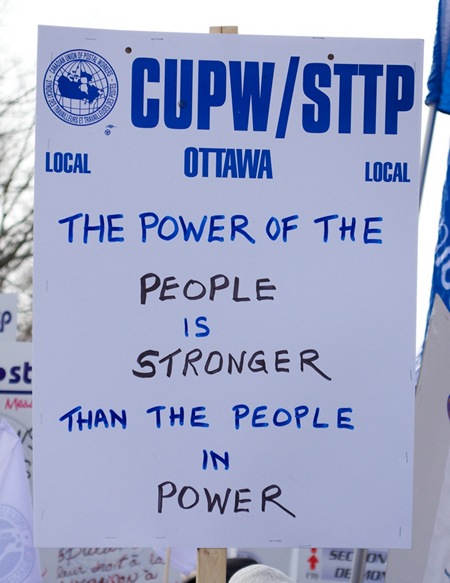 The way the Minister spoke
of the workers' aim being "to get their way" is designed to warrant
whatever measures the government will pass in the name of defending the
interests of the people and the nation and the national interest
against the allegedly narrow interest of the workers. In fact the
workers were merely using a negotiating tactic that is established in
law and has been part of the Labour
Code for decades. The Minister consciously referred to the
concept "inflicting economic damage" as being harmful to the
national interest even though it is central to labour laws and the
negotiation process itself. Through a decree by the party in power and
the usurpation of the public interest by private interests, this legal
labour process is pronounced to be an attack on the national interest.
In other words, the attacks on working conditions by monopolies
such as Air Canada and attacks by Canada Post to dismantle and
privatize services and inflict a terrible burden on the workers are not
to be questioned. The monopolies are protected by
the executive power which is by definition an arbitrary power
which operates outside the government of law. The government then
uses its majority in the Parliament to declare its anti-worker
measures "law." Through sleight of hand, the arbitrary power
becomes "law." It is very self-serving indeed.
The way the Minister spoke
of the workers' aim being "to get their way" is designed to warrant
whatever measures the government will pass in the name of defending the
interests of the people and the nation and the national interest
against the allegedly narrow interest of the workers. In fact the
workers were merely using a negotiating tactic that is established in
law and has been part of the Labour
Code for decades. The Minister consciously referred to the
concept "inflicting economic damage" as being harmful to the
national interest even though it is central to labour laws and the
negotiation process itself. Through a decree by the party in power and
the usurpation of the public interest by private interests, this legal
labour process is pronounced to be an attack on the national interest.
In other words, the attacks on working conditions by monopolies
such as Air Canada and attacks by Canada Post to dismantle and
privatize services and inflict a terrible burden on the workers are not
to be questioned. The monopolies are protected by
the executive power which is by definition an arbitrary power
which operates outside the government of law. The government then
uses its majority in the Parliament to declare its anti-worker
measures "law." Through sleight of hand, the arbitrary power
becomes "law." It is very self-serving indeed.
The exercise of the arbitrary power in the name of high ideals is a major problem that the workers face. Their actual working conditions are hidden behind a wall of silence and disinformation and all the arrangements which presumably used to provide a "level playing field" are now stacked against them in the name of the national interest.
How can what is called the national interest be used to undermine the rights of the workers and people?
"Canadians gave this government a strong mandate to complete our economic recovery. As Canada's labour minister, it is my view that the Government of Canada must take decisive action now before real damage is done to our economy. That is why our government has put legislation on notice to ensure continuing air service for passengers," said the federal Labour Minister in 2011 regarding the Air Canada workers' fight for their rights.
This raises another characteristic of the present situation and that is fraud. For the party in power to say that it has a mandate to put all of society's resources at the disposal of the monopolies and to attack the workers who are fighting for their rights is a fraudulent statement. The more neo-liberal governments pursue the anti-social offensive and nation-wrecking, the more public institutions that are said to defend the public interest are liquidated. The more governments claim a "mandate," the more they do as they please. These "mandates" are achieved through electoral coups bolstered by massive disinformation campaigns. They marginalize the people from decision-making in the matters which affect them, and the parties of the establishment degenerate further.
To speak of a mandate is to cover up the further concentration of economic and political power in fewer and fewer hands. What is required is the alternative advanced by the working class, which begins precisely with the rejection of the fraud that these governments have a mandate to govern in our name, and to fight to put decision-making power in the people's hands so that we can turn things around in our favour.
One of the most striking aspects of the disinformation which is pushed on the workers' movement is that the workers have a choice not to be criminalized if they agree to voluntarily accept the dictate of the monopolies and accept that there are to be no negotiations.
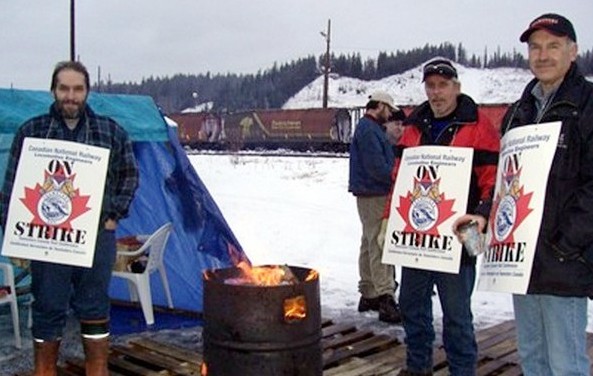 November 28, 2009: Strking CN workers in Prince George (Opinion250) |
In 2009, the CN workers went on strike to defend their health and safety. The health and safety of the railway workers is synonymous with the health and safety of the passengers in the case of passenger rail, and of the freight in the case of freight trains and of communities and the environment in both cases. The rights of the workers are thus far from being "private interests." They are a public interest.
The Labour Minister at that time stated in Parliament regarding the threat of back-to-work legislation:
"My preference has always been for the two sides to resolve their own labour dispute but since this has proven impossible, our Government must act to protect the public interest. We cannot allow a major disruption of our transportation system. CN is a vital component of Canada's economic infrastructure and we will do what is necessary to protect Canadians' jobs and the country's prosperity....We will not impose a settlement on the employer and union, but we will introduce legislation to end the strike.... This is more than a private dispute between CN Rail and the Teamsters Canada Rail Conference. It has serious repercussions for the national economy at a time when Canada's recovery from the global recession is still fragile."
The Minister's parliamentary secretary stated:
"No one in the House likes back-to-work legislation. All of us prefer to see employers and unions freely bargain their collective agreements. That is certainly something that happens in the course of events, and many times there are struggles and difficulties to get there, but eventually a method is found to resolve an impasse, which is exactly how it should work if it can. But sometimes the parties are unable to reach agreement. Sometimes parties reach an impasse and a strike or lockout tends to happen and, in that case, it affects the national economy. When that happens Parliament must act in the public interest."
This was in fact an attack against the workers mounted by CN and the government. After months of trying to get the workers to accept drastic changes in their working conditions that would have forced them to increase their hours and further aggravate the already serious problem of fatigue, CN threatened to unilaterally impose changes to their working conditions after a given date. The workers' only remaining legal option to counter an automatic change to their working conditions was to go on strike. CN was pushing for a strike while the government supported the company's shock-and-awe tactics against the workers by threatening back-to-work legislation if they did not "voluntarily agree" to the rail monopoly's demands.
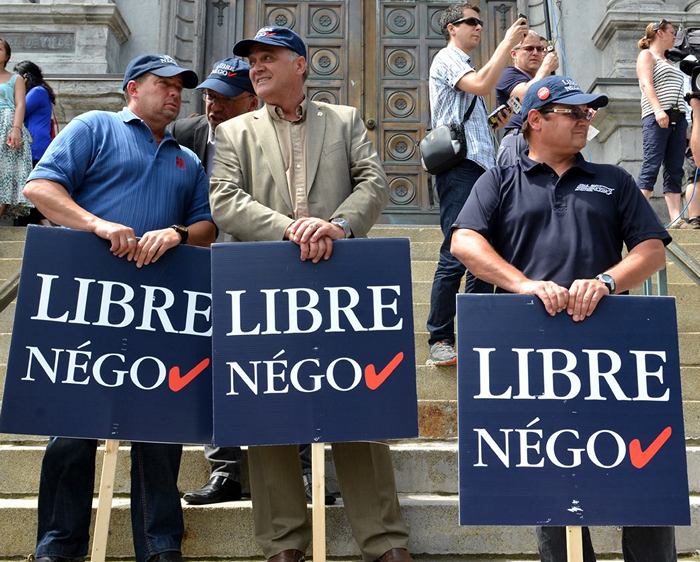 In Quebec we have the
firsthand example of what has happened
with the municipal workers, especially the blue-collar workers.
The City of Montreal is in the process of a massive restructuring
of its functioning and this has international ramifications
especially with its transformation into a hub for neo-liberal
free trade. When the workers try to find the space to negotiate
and bring their demands to defend their working conditions and
the services they provide, they are met with provocations to the
effect that if they do not "voluntarily accept" the destruction
and privatization of their jobs and public services, they will be
criminalized. The City is silent on the working conditions it
wants to impose. It uses grandiose neo-liberal phrases to cover
up what it is up to, saying it wants to "make Montreal a
world-class city." And when the blue collar workers hold public
actions to break the silence on what is really happening and to
mobilize public opinion to defend the public interest, they face
the concerted onslaught of the city council, the media, the
courts and the police.
In Quebec we have the
firsthand example of what has happened
with the municipal workers, especially the blue-collar workers.
The City of Montreal is in the process of a massive restructuring
of its functioning and this has international ramifications
especially with its transformation into a hub for neo-liberal
free trade. When the workers try to find the space to negotiate
and bring their demands to defend their working conditions and
the services they provide, they are met with provocations to the
effect that if they do not "voluntarily accept" the destruction
and privatization of their jobs and public services, they will be
criminalized. The City is silent on the working conditions it
wants to impose. It uses grandiose neo-liberal phrases to cover
up what it is up to, saying it wants to "make Montreal a
world-class city." And when the blue collar workers hold public
actions to break the silence on what is really happening and to
mobilize public opinion to defend the public interest, they face
the concerted onslaught of the city council, the media, the
courts and the police.
Criminal proceedings will begin in 2018 regarding the so-called rampage of municipal workers in front of Montreal City Hall in August 2014 when they held a protest to protect their pensions. The trial of the accused workers will go on for months, the media say. A major aspect of the workers' action, on which the media have been completely silent, is that they dumped copies of their collective agreement at City Hall to express the truth that it is not worth the paper on which it is written.
This is an example of a real problem the workers face. The arrangements that are supposed to protect the workers and recognize their rights, such as the right to collective bargaining and labour laws, have been rendered useless. The space for negotiations that would permit the workers to present demands has been abolished by decree. Anti-social austerity has become the law and the workers who defend their rights are criminalized.
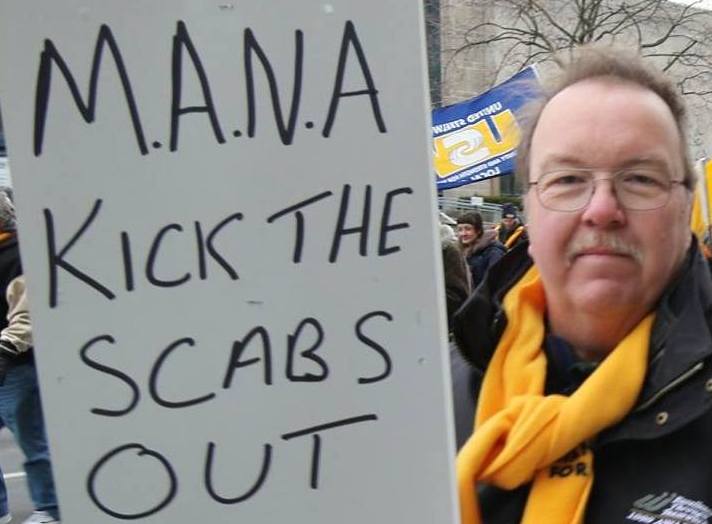 There is no such thing as
voluntarily submitting to dictate.
The dictum "submit or else face the full force of the law"
expresses the brutal arbitrary rule when "the law" is unfair,
unjust, undemocratic and, more so, despotic.
There is no such thing as
voluntarily submitting to dictate.
The dictum "submit or else face the full force of the law"
expresses the brutal arbitrary rule when "the law" is unfair,
unjust, undemocratic and, more so, despotic.
Today, negotiations have been replaced by fraud and coups against the workers. In Hamilton, the MANA workers have been locked out for three years while the company runs the plant with scabs. Where is the government that will take action against the company for unfair labour practices? Far from the law creating a "fair playing field," the government's self-serving stand is that it has no jurisdiction on matters pertaining to labour law. But when monopolies demand that labour law be scrapped, governments are only too happy to comply in the name of high ideals. Meanwhile, the media and others carry out disinformation amongst the people and the workers' movement that the workers are opposed to progress and the financial well-being of the nation, the cities and the companies. Their mantra is that the workers are selfish for wanting to impose "their own way" on the allegedly altruistic aims of the governments and companies who only want "prosperity."
The same thing is done in the case of construction
workers. They are accused by their employers, the government and the
media of intimidation. It is all a diversion to cover up the brutal
conditions on the construction sites where workers are dismissed or do
not have their contracts renewed for objecting to unsafe working
conditions or violations of the collective agreement. It also diverts
attention from the corrupt relations between the party in power,
contractors and engineering firms.
The new Trudeau government has picked up from where the
Harper government left off. It says that one of its major concerns is
the struggle against inequality. An example of what it means can be
seen on the question of Employment Insurance in the 2016 budget. The
first thing that stands out is that although during the federal
election Trudeau said that he would ensure that funds allocated for
Employment Insurance would be used for that purpose, the Trudeau
government has decided to continue down the disastrous path taken by
the Chrétien and Martin governments, putting these funds into
general revenues, which resulted in the misappropriation of tens of
billions of dollars from the EI program in the 1990s. Taking up again
the issue of inequality, the government continues to deprive workers of
EI benefits. It has established a notion of "equality" that a two-per
cent increase in unemployment in an area is the threshold for
unemployed workers there to qualify for a five-week extension in EI
benefits, thus excluding workers in all jurisdictions where this magic
number is not attained from these same benefits. Calculating how many
workers are jobless is itself subject to an unacceptable method that
ignores all those who have given up looking for work.
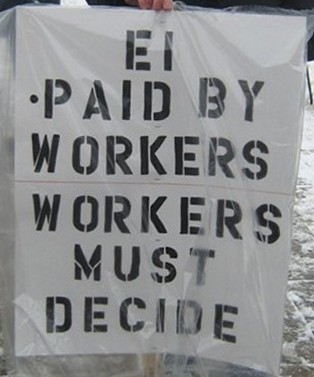 In other words, it has
enshrined a notion of "equality" based on a mathematical formula that
deprives hundreds of thousands of workers of benefits. In effect, the
criteria for the extension of benefits are based on the official
regional unemployment rate and not the actual conditions facing the
workers and definitely not on the requirement that all workers who lose
their jobs should be able to receive sufficient benefits to maintain a
Canadian standard of living. According to this system, an
increased
unemployment rate in a region means that fewer work hours are required
to qualify for EI and extended benefits are also available (although
still totally inadequate) unlike in those regions where there has been
a lower increase in unemployment. Time will tell how
the concepts advanced by the Trudeau government will play out,
but this example clearly shows that it does not recognize the
existence of rights based on objective conditions.
In other words, it has
enshrined a notion of "equality" based on a mathematical formula that
deprives hundreds of thousands of workers of benefits. In effect, the
criteria for the extension of benefits are based on the official
regional unemployment rate and not the actual conditions facing the
workers and definitely not on the requirement that all workers who lose
their jobs should be able to receive sufficient benefits to maintain a
Canadian standard of living. According to this system, an
increased
unemployment rate in a region means that fewer work hours are required
to qualify for EI and extended benefits are also available (although
still totally inadequate) unlike in those regions where there has been
a lower increase in unemployment. Time will tell how
the concepts advanced by the Trudeau government will play out,
but this example clearly shows that it does not recognize the
existence of rights based on objective conditions.
To face this assault and step up the fight for their
rights
and the rights of all and for the alternative, workers need their
own institutions that enable them to build their independent
voice and find their bearings at this time when rapid changes are being
made on
all fronts that affect them. The Marxist-Leninist Party has
established the Workers' Centre to make sure that the silence is
broken on the workers' living and working conditions and on the
fights they are waging to defend what belongs to them by right. The
work to strengthen the Workers' Centre is taking centre stage today so
that the workers can be self-reliant. This work is key so that the
workers can open society's path to progress.
Note
1. In October 2011 the Parliament
passed the Restoring Mail
Delivery for Canadians
Act. The Canadian Union of Postal Workers filed a Charter
of
Rights
and
Freedoms challenge with the Ontario Superior Court, claiming that
this back to work
legislation violated their right to free expression. On April 28, 2016
the Court issued its
decision. It found that the law did violate postal workers' rights, and
was
unconstitutional.
(Translated from original French by
TML.)
Photo Review
May 1, 2015 - May 1, 2016
Manufacturing Yes! Nation-Wrecking No!
Successful Hamilton Day of Action, organized by steelworkers January 30, 2016, demands governments uphold the law and defend public right.

Active and retired
steelworkers from United Steelworker Locals 1005 and 8782 attend the
Ontario Superior Court in Toronto October 7-8, 2015 where U.S. Steel
presents several
motions for its phoney bankruptcy proceedings.

Hamilton steelworkers picket the office of Conservative MP David Sweet (Ancaster-Dundas-Flamborough-Westdale) October 2, 2015 to hold the Harper government to account for its secret deal with U.S. Steel.
September 7 -- Labour Day in Hamilton.
 Hamilton steelworkers hold a dinner July 24, 2015 to
express their
profound appreciation for
outgoing President Rolf Gerstenberger and Vice-President Jake Lombardo
and the decisive
role played by Local 1005 USW over the past 12 years.
Hamilton steelworkers hold a dinner July 24, 2015 to
express their
profound appreciation for
outgoing President Rolf Gerstenberger and Vice-President Jake Lombardo
and the decisive
role played by Local 1005 USW over the past 12 years.

A
thousand workers from across the country attending the Unifor national
council meeting in Montreal on August 21 protest the
neo-liberal
agenda of the Harper
government and attacks
on the rights of workers by global monopolies.

Working people confront Conservative leader Stephen Harper at an August 19 campaign stop in London. Protestors highlight the brutal destruction of manufacturing in the region as well as the government's anti-terror laws and attacks on public services and social programs.
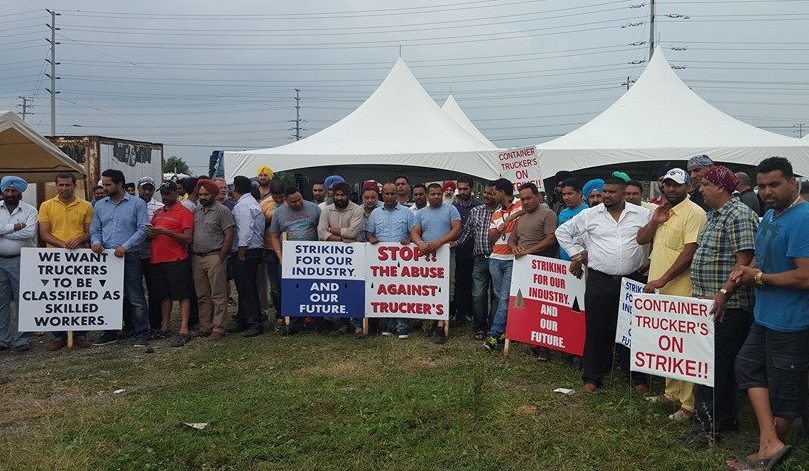
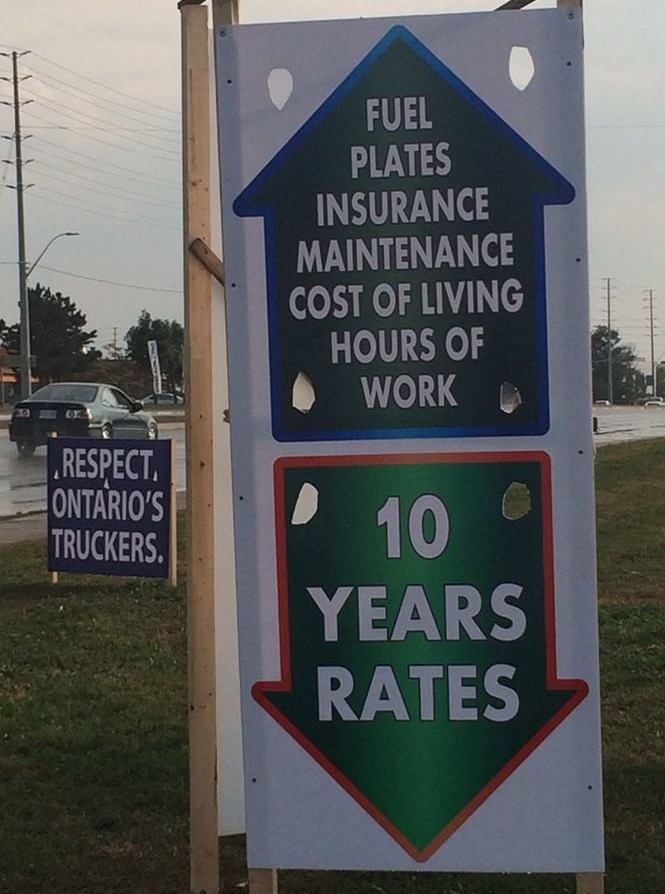
Brampton
truckers hold strike rally September 8. Better working
conditions, a safe work
environment and respect are the three main demands of dozens of truck
drivers who have
been fighting the arbitrary actions of their employer and the
injustice of the Canada Labour Code.



A lively demonstration
and
public meeting
take place in Lac-Mégantic
October 11 to
demand
rail
safety
and rerouting of the rail line that runs through
the town, while maintaining the economy of the region that relies on
rail transport.

Rally in
Lac-Mégantic marks the second anniversary of the July 6
train derailment
which killed 47 people.
 Autoworkers
organize
rallies
across
Ontario
on
September
23,
during
the
federal
election,
Autoworkers
organize
rallies
across
Ontario
on
September
23,
during
the
federal
election,
holding the Harper government to account for its secret Trans-Pacific
Partnership negotiations.
Photos above from Essex.


Hundreds
of farmers and
dairy industry workers from Quebec and Ontario drive tractors and
trucks from their communities to Ottawa for a militant rally on
Parliament Hill on
September 29 in
response to Canada's participation in secret negotiations for the
neo-liberal TPP trade deal which resumed in Atlanta.



The Quebec
Union of
Agricultural Producers (UPA) holds a mass rally September 24 to defend
the supply management system outside the Montreal venue where
the French-language
leaders debate is to take place.
More than 1,000 farmers from across
Quebec participate,
joined by farmers from Ontario.

Three
hundred
Quebec
farmers
and
dairy,
egg
and
poultry
producers
rally
at federal Minister Denis Lebel's office on July 27 to demand
the supply management system, endangered by the Trans-Pacific
Partnership negotiations, be protected.

Seafarers
picket
in
Burlington against
the Harper government and its neo-liberal
Comprehensive Economic Treaty
Agreement with Europe.
This September 1 action was
one of many held by the Seafarers to defeat
Harper and stop CETA.
Defend the Public Post Office
Postal workers rally outside Harper's Calgary constituency office August 14 during their national tour calling for an end to the service cuts.
Postal workers kick off coast-to-coast national tour in St. John's, Newfoundland on July 15. The cross country tour to defeat Harper and defend the public post continues throughout the federal election campaign.

Postal workers join other working people in picket that greets Harper's May 13 visit to Windsor.

Rally May 7, 2015, during the Canadian Union of Postal Workers convention defends the
public post office & CUPW expresses determination to defeat Harper.
Public Sector Workers
Oppose Austerity Agenda

Public
service
workers
rally
in
Ottawa
June 15 against
the
latest
omnibus
bill,
Bill
C-59,
which
if
passed would unilaterally change their sick leave in
violation of their contracts.

From
early 2015 until the October
19 federal election public sector workers carried monthly protests
against wrecking of services by the federal government and to defeat
Harper. This
one in Gatineau May 19, 2015.

Federal public service workers protest in Manotick, Ontario May 12 outside the constituency office of Pierre Poilievre, Minister of Employment and Social Development, against the government's unilateral decision to remove sick leave benefits from their collective agreement.

Working people take to the streets in Montreal, Quebec City and elsewhere in Quebec December 9 as the 400,000-strong Common Front holds a one-day strike across Quebec in an attempt to break the impasse imposed on negotiations by the Couillard government's obstinacy.

Thousands
of
people
demonstrate in Montreal November 28 against the austerity and
privatization agenda
of the Couillard government.

Demonstration November 12 by public sector workers in Bas-Saint-Laurent (above) and Sherbrooke in response to another unacceptable offer by the Couillard government.

Quebec's public sector workers' mass action of 150,000 people in Montreal on October 3 demands the government end its attacks on workers and negotiate to provide them with the wages and working conditions they require.

Workers from many unions rally at London City Hall June 30 in support of the 750 city inside workers who have been on strike since May 25 to oppose the city's attempt to extort major concessions from them on working conditions.

June 15 -- Ontario working people say "Hands Off Our Public Assets" at Queen's Park protest against the Wynne government's plans to sell Hydro One.

More than 2,000 people demonstrate at the Ontario Liberal Party's annual general meeting June 6 under the banner, "Stand Up for Ontario!" They demand the privatization of Ontario Hydro be stopped and legislation outlawing strikes by high school teachers in three Ontario school districts be withdrawn.
Health Care Is a Right!
Nurses joined by steelworkers and other allies in rally against cuts at St. Joseph's Hospital in Hamilton, March 1, 2016.
Ontario Health Coalition (OHC) organizes
protests January 18-February
1 in defence of
public health care and against austerity agenda, culminating with a
rally at Queen's Park
in Toronto. Rallies are held in cities where the
provincial government is
holding
"pre-budget consultations" (see below).

Ottawa


Windsor

Hamilton
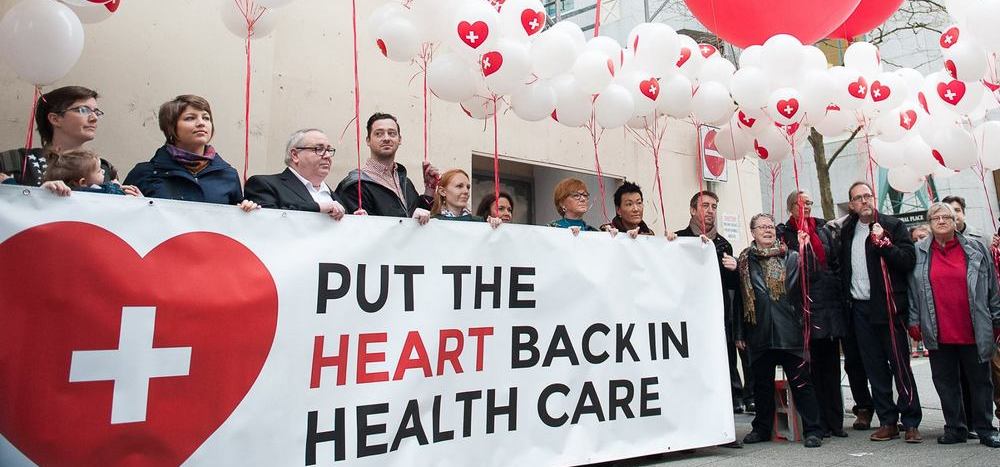
Healthcare
workers
rally
January
20,
2016,
outside
first
ministers'
meeting
in
Vancouver
in
defence of public health care.



A day of action June 15 across Canada and Quebec demands the Harper government restore health care services for refugees. Above are actions in Halifax, Toronto and Hamilton.

Nurses
demonstrate
during
Canadian
Federation
of
Nurses Unions' national
convention in
Halifax, June 5, 2015, putting health care on the agenda in the federal
election, with placards
that say: "Vote for the Health Care We Deserve."
May 20 day of
action is organized by
Quebec
healthcare workers
against austerity measures
being
implemented by the Couillard government. Photos taken in Mount
Royal.
Teachers and Education Workers Defend Public Education



Teachers
march
through the streets of the Hochelaga-Maisonneuve district in
Montreal, January 16, 2016, to reject dismantling of public education
system and demand increased investments.



September 30,
thousands of
Quebec teachers demonstrate in Montreal demanding proper
wages and
working conditions so they can provide students with the education
they
require.

Teachers
and
education
workers
demonstrate
at
the June 13 annual
general
meeting
of
Ontario
Public School Boards' Association. They reject the Association's
demands in
negotiations for
concessions that would erode teachers' working conditions.
Pickets
outside
schools in Jonquiere and Sept-Iles in May 2015 defend public education
in
the
face of the Quebec government's austerity agenda.
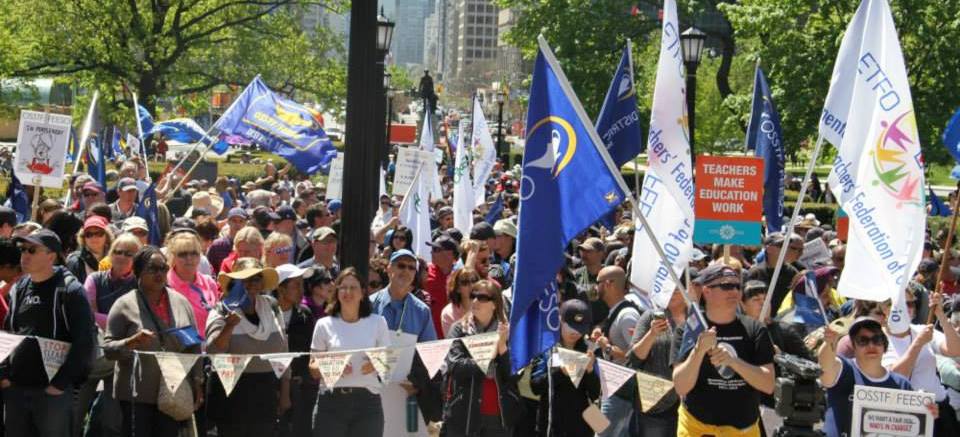
Ontario teachers
and education workers rally at Queen's Park May 14, 2015, as part of an
ongoing fight
for a negotiated contract that upholds their rights and defends public
education.
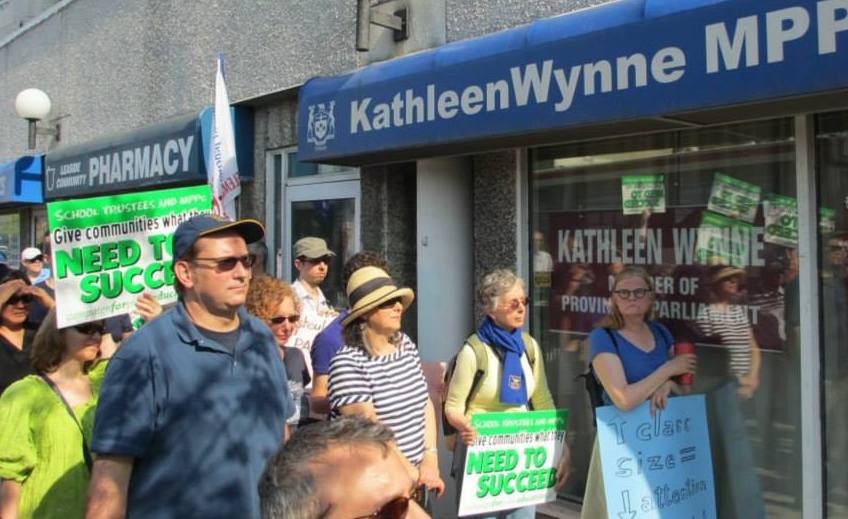
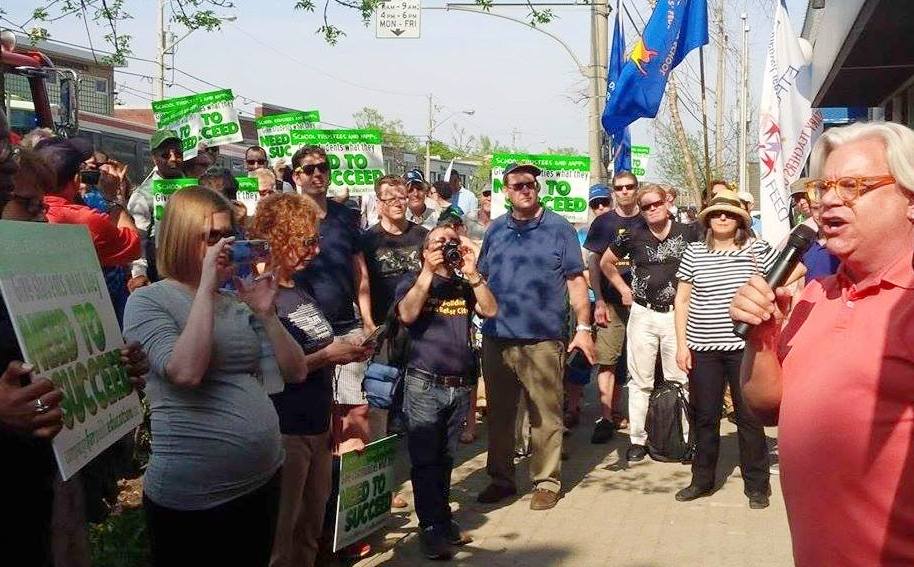
Pickets
by
teachers at
offices of Premier Wynne and other Liberal MPs on May 8, 2015,
demand
the government negotiate collective agreements.
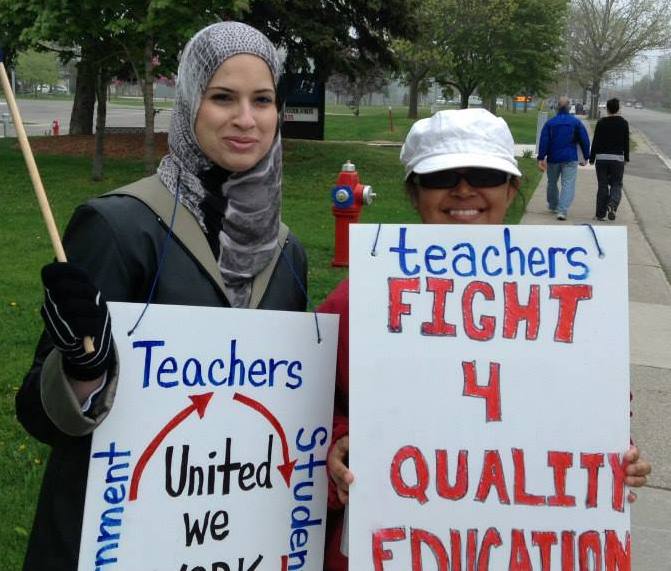
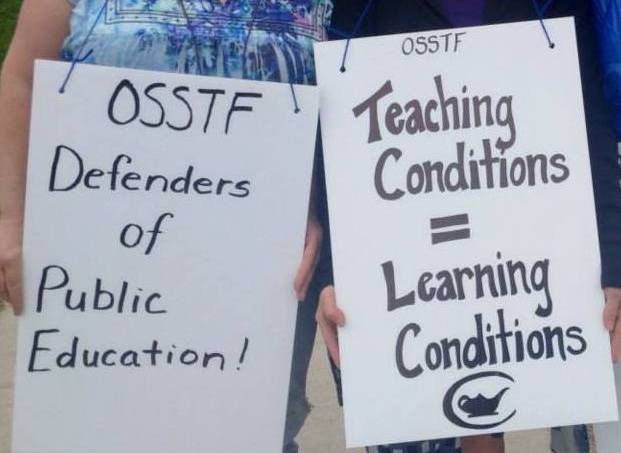
High
school teachers
strike against three Ontario School Boards to back their demands,
including Peel District, shown above.
Justice for Injured Workers!
The Ontario Network of
Injured
Workers'
Groups
holds annual Christmas protest at the Ontario Ministry of Labour in
Toronto on December 14. The
action affirms the right of all Ontarians to compensation for
work-related injuries and illnesses and decries the poverty and
indignity caused by the unjust denial of
compensation by the WSIB and employers.
Delegates to Ontario Federation of
Labour biennial convention in
Toronto join injured
workers in a march and rally November 26 to demand
an end to suppression
of injured workers' just claims.
Rally at Queen's Park
in Toronto, march and conference held to mark Ontario
Injured Workers'
Day on June 1, 2015.
Defend the Rights of All Working People!
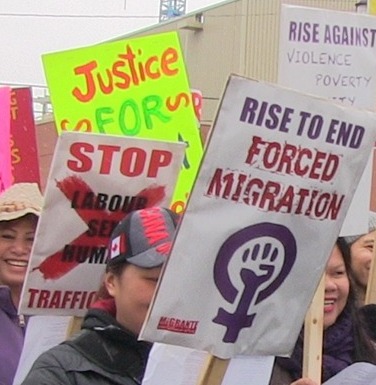

Migrant workers put forward their
demands at International Women's Day
action
in Edmonton, March 6, 2016.
Contingents in
International Women's Day march in Toronto, March 5, 2016 demand end to
precarious work and unequal wages, and that public services set the
example by eliminating it.

Taxi drivers rally at Toronto City Hall December 4 against the Uber ride-sharing monopoly.

November
15-16,
hundreds
of
Edmonton
cab drivers rally at the Alberta Legislature to demand government
action against the illegal operation of the U.S. "ride-sharing"
monopoly Uber that is wrecking the taxi
industry.
Our Security Lies in the Fight for the Rights of All
April 28, 2016 workers across Canada and
Quebec mark the National Day
of Mourning (DOM)
for workers killed, injured or made ill at work under the
banner "Mourn for the Dead, Fight
for the Living." Ceremony above at
Pearson Airport in Toronto where a young worker was
recently killed on
the job.
Hamilton City Hall
Calgary

Actions across Canada and Quebec on the 13th anniversary of the Iraq
war call for an
anti-war government and an end to Canada's participation in U.S.
empire-building abroad.
Photo above from Ottawa march.
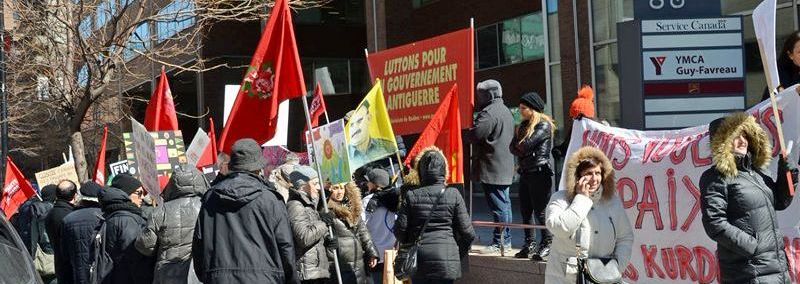
Montreal

Vancouver
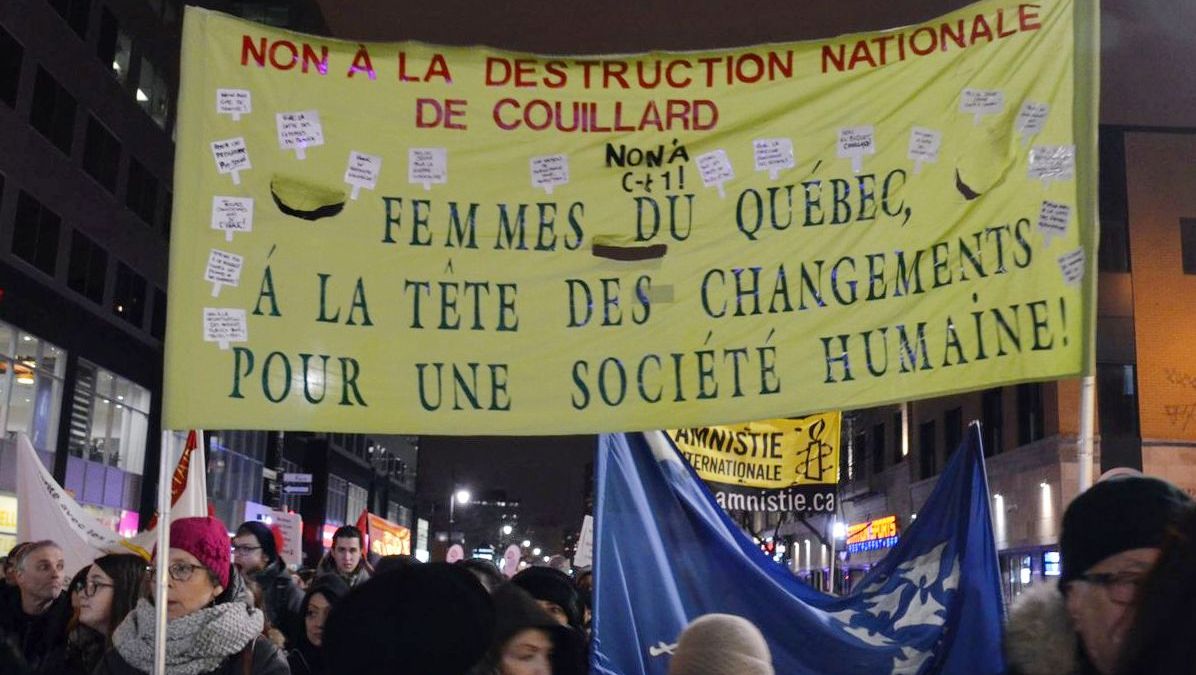
International Women's Day, March 8, 2016, celebrated with myriad
marches, rallies and get-togethers, affirms the rights
of women and their fight to provide women's rights with a
guarantee is part of the fight to emanicipate all
humanity. Above photo from Montreal march.

Sorel-Tracy
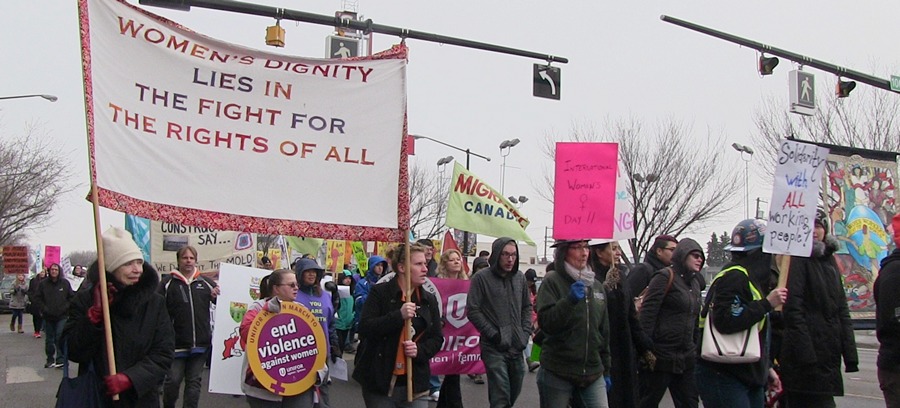
Edmonton
 Three
hundred public service workers,
postal workers, Unifor members, Teamsters, nurses, Indigenous people
and concerned Canadians from Nova Scotia and New Brunswick unite in a
boisterous demonstration May 14 at a Conservative campaign event
featuring Prime
Minister Harper with calls for the defeat of his government.
Three
hundred public service workers,
postal workers, Unifor members, Teamsters, nurses, Indigenous people
and concerned Canadians from Nova Scotia and New Brunswick unite in a
boisterous demonstration May 14 at a Conservative campaign event
featuring Prime
Minister Harper with calls for the defeat of his government.
May 30 Day of Action, organized by working people across Canada, is
part of
ongoing actions demanding Bill C-51 be defeated and affirming that
"Our Security Lies
in the Fight for the Rights of All!" March above in Vancouver.
Calgary
Hamilton

Two Row
Wampum leading Day of Action Against Bill C-51 expresses working
peoples' lead in building
new nation-to-nation relations with Indigenous peoples.

Walk for Reconciliation in Ottawa,
May 31, 2015 affirms
sentiment of the
Canadian people to
see justice for Indigenous peoples and an end to
colonial
relations.
Actions demanding justice for Indigenous peoples take place across Canada April 13-15, 2016 in response to the State of Emergency declared in Attawapiskat. These include occupations and protests at the offices of Indigenous and Northern Affairs Canada (INAC) in Toronto, Ottawa/Gatineau, Winnipeg and Regina.


Demonstrations across Canada and Quebec
in September and October 2015 demand the government take up its
responsibilities for the refugee
crisis and express the stand of the
Canadian people, "Refugees Welcome
Here." Above action in
Montreal, October 10.


Ottawa, September 6 & 13



Regina, September 8

Vancouver,
September
6
Nation-Building in the 21st Century or Empire-Building
Postnational and Supranational State --
Where Does
Jurisdiction Lie?
In today's world, the bourgeoisie is working to destroy the nation: it sells the nation's assets and put its human, material and natural resources at the disposal of monopolies competing on world markets. In the 19th century an Anglo-Canadian state was established based on the model of the European nation-state. Over the years different arrangements were brought into being to better meet the requirements of the ruling class in terms of power-sharing between the federal and provincial levels of government, continuing the suppression of the Quebec nation and maintaining the colonial relations with the Indigenous peoples. These arrangements are also designed to keep the working class and people in thrall and maintain the privileged position of the ruling class. Since the mid-1980s and especially since the advent of the Chrétien government in 1993, the post-World War II arrangements have been replaced by arrangements that promote the success of the most powerful monopolies on world markets. This is done regardless of the consequences for the nation, its economy, trade, social, cultural and political affairs, as well as the rights of its citizens and residents.
In practice this means that major decisions about the direction of the economy are taken by private global monopoly interests that have taken over the public authority. The trade agreements concluded on this basis give global monopolies the right to challenge the national public authority and destroy the national networks of public services and social programs and subordinate public right. Far from responding to people's needs on the basis of a modern definition of the rights of all in this new period, today rights are being redefined on a neo-liberal basis, saying that society is not responsible for the well-being of its members and even that it does not exist. Instead governments should ensure monopoly right at all times.
Meanwhile, the refusal to renew the political arrangements gives rise to a view that there is no alternative. The illusion is fostered that the old arrangements were better and can be re-established if only the right policies are adopted. All of it is done to keep the working people disoriented and unable to establish a foothold. They are told to choose between two sets of policies which in fact are two variants of the same nation-wrecking program to pay the rich.
All of it is aimed at distracting the workers from the fundamental issue that their lives depend on their ability to affirm their rights -- that belong to them by virtue of being human and by virtue of being those who produce the value society depends on for its living. The fact that the decisions which affect their lives are being taken on a supranational basis and imposed on them with the dictate that they submit or be criminalized means that where they can get redress for crimes and injustices committed against them becomes an issue of great concern.
 What is the authority and
over what jurisdiction does it preside has emerged as an important
matter at this time. The word "jurisdiction" (from the Latin ius/iuris meaning "law" or "right"
and dicere meaning "to
speak") is the practical authority granted to a legal body to
administer justice within a defined area of responsibility. It is
the extent or range of judicial, law enforcement or other
authority -- the territory over which that authority is
exercised. Once the jurisdiction of the authority is no longer
national, who will uphold the rights of the people and according
to what criteria?
What is the authority and
over what jurisdiction does it preside has emerged as an important
matter at this time. The word "jurisdiction" (from the Latin ius/iuris meaning "law" or "right"
and dicere meaning "to
speak") is the practical authority granted to a legal body to
administer justice within a defined area of responsibility. It is
the extent or range of judicial, law enforcement or other
authority -- the territory over which that authority is
exercised. Once the jurisdiction of the authority is no longer
national, who will uphold the rights of the people and according
to what criteria?
Examples of this problem abound such as the destruction through free trade agreements of the public services and programs provided by municipal and other authorities and the destruction of manufacturing. What happens to workers' rights when the bankruptcy courts deprive them of their pensions and benefits or when governments attack the unions?
In the midst of this nation-wrecking, concepts are put forward such as that Canada is a "postnational state," i.e., the nation-state is finished and we are living in an age of "supranational states."
Postnationalism is described as the "process or trend by which nation-states and national identities lose their importance relative to supranational and global entities." Some also refer to this as the "postmodern state," characterized as the removal of any national basis for the state, "the breaking down of the distinction between domestic and foreign affairs and mutual interference in (traditional) domestic affairs and mutual surveillance," "the growing irrelevance of borders," and other aspects.[1] The term came into use in the 1990s with the end of the bipolar division of the world and the rise of neo-liberal globalization.
Academic works note the rise of "supranational" institutions, described as a "global trend of shifting governance tasks from states (including their sub-entities) to non-state actors... More and more private for profit and non-profit organizations step in to fill the void left by states. At the same time, there is a tendency to move governance tasks to inter- or supranational entities..." As well, "non-State [supranational] actors now play a key role in world governance in different fields and have become essential instruments within the international system."[2]
Regardless of the policies adopted by governments within this framework, it is only leading to nation-wrecking and further anarchy and violence. Workers must have jurisdiction. Rights without redress are not worthy of the name.
Further on These Definitions
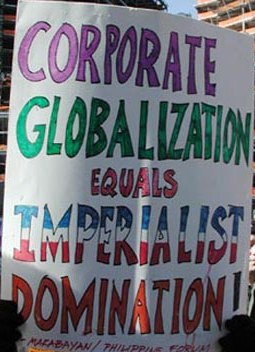 With the "postnational state"
there is a transfer of
authority and sovereignty over its territory to global monopolies
and finance capital in the form of supranational organizations --
free trade agreements (NAFTA, Trans-Pacific Partnership), the
World Trade Organization, World Bank, IMF, OECD, as well as
military bodies such as NATO. The impression is given that this
is synonymous with a loss of a "uniform" national identity and
the "postnational state" is modern and opposing it is
retrogressive. This aspect has to do with identity and is being used by
Minister of Foreign Affairs Stéphane Dion and Prime Minister
Justin Trudeau when it comes to questions of citizenship and rights to
justify what cannot be justified. Some academics link the notion of the
"postnational
state" with questions of identity.
With the "postnational state"
there is a transfer of
authority and sovereignty over its territory to global monopolies
and finance capital in the form of supranational organizations --
free trade agreements (NAFTA, Trans-Pacific Partnership), the
World Trade Organization, World Bank, IMF, OECD, as well as
military bodies such as NATO. The impression is given that this
is synonymous with a loss of a "uniform" national identity and
the "postnational state" is modern and opposing it is
retrogressive. This aspect has to do with identity and is being used by
Minister of Foreign Affairs Stéphane Dion and Prime Minister
Justin Trudeau when it comes to questions of citizenship and rights to
justify what cannot be justified. Some academics link the notion of the
"postnational
state" with questions of identity.
"The context for this possible transformation is defined by two major, partly interconnected conditions. One is the change in the position and institutional features of national states since the 1980s resulting from various forms of globalization. These range from economic privatization and regulation to the increased prominence of the international human rights regime. The second is the emergence of multiple actors, groups and communities partly strengthened by these transformations in the state and increasingly unwilling to automatically identify with a nation as represented by the state [...]"[3]
This theme was also taken up by former Liberal Party leader Michael Ignatieff, who in his book Blood and Belonging wrote, "a cosmopolitan, post-national spirit will always depend, in the end, on the capacity of nation-states to provide security and civility for their citizens."
Justin Trudeau specifically referred to the "postnational state" six days after being sworn in as Prime Minister. "There is no core identity, no mainstream in Canada,'' Trudeau claimed. ‘‘There are shared values -- openness, respect, compassion, willingness to work hard, to be there for each other, to search for equality and justice. Those qualities are what make us the first postnational state.''
This gives an impression that the state is being restructured according to those values listed above. Of course the reality is that the so-called postnational state to which Justin Trudeau refers is one which requires the restructuring of the state to find new ways to pay the rich. It is postnational in the sense that it does not recognize the sovereignty of nations and peoples, only that of the monopolies and the international gendarmerie imposed by the imperialist system of states. But, according to the logic that there is a set of values Canadians all share, it is also an attack on the need to forge a modern identity and values on the basis of the affirmation of the human right to conscience. What is hidden is that these values of which Justin Trudeau speaks are defined by arbitrary powers outside the government of laws. This has always been the case but today it is on a "supranational" basis within today's neo-liberal global context.
To go further into the conception of the "supranational state," we find that the Oxford Dictionary defines supranational as "Having power or influence that transcends national boundaries or governments: "supranational law." Official supranational state structures or arrangements may be recognized as in the case of the European Parliament or may not be recognized as in the case of the secret deals to integrate Canada, the United States and Mexico. A new United States of North American Monopolies has been created behind the backs of the people and it is secret. In fact, the United States likes to refer to the example of territorial conquest and empire by the British and others to say it has no empire. Far from this being the case, the U.S. imperialists impose their hegemony through supranational arrangements.
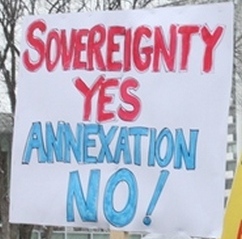 The supranational authority
exists and is a force to the extent that it can limit the exercise and
sovereignty of a nation-state or nations and peoples themselves and
impose its own decision-making power, rules, arrangements and demands,
as well as summary justice through targeted assassinations, renditions
to torture and indefinite detention. Control is exercised by
supranational organizations -- financial, social, cultural, military,
police or otherwise -- which cannot be held to account within a
national jurisdiction except insofar as a sovereign nation could reject
their ability to enforce their decisions within its national territory.
The imperialist system of states makes sure the initiative is handed
over to supranational bodies such as the World Trade Organization,
International Criminal Court, NATO, "coalitions of the willing" and
others of like kind.
The supranational authority
exists and is a force to the extent that it can limit the exercise and
sovereignty of a nation-state or nations and peoples themselves and
impose its own decision-making power, rules, arrangements and demands,
as well as summary justice through targeted assassinations, renditions
to torture and indefinite detention. Control is exercised by
supranational organizations -- financial, social, cultural, military,
police or otherwise -- which cannot be held to account within a
national jurisdiction except insofar as a sovereign nation could reject
their ability to enforce their decisions within its national territory.
The imperialist system of states makes sure the initiative is handed
over to supranational bodies such as the World Trade Organization,
International Criminal Court, NATO, "coalitions of the willing" and
others of like kind.
This is very different from the international rule of law sanctioned after World War II whereby conventions were adopted such as the Universal Declaration of Human Rights and its binding treaties. These meant that nation states ratified them after adopting the required national legislation required to bring countries into conformity with the standards of the international conventions. The Convention against Torture and Other Cruel, Inhuman or Degrading Treatment or Punishment, laws prohibiting crimes against the peace and the like all refer to international standards by which countries agree to abide.
Literature on supranational institutions often speaks of their originating with countries that band together for causes said to serve the greater good. Pretexts include economic prosperity or humanitarian expectations such as opposition to genocide, abuse of women, religious persecution, weapons of mass destruction or use of chemical weapons. These pretexts have quickly been exposed as fraudulent. The aim is to make the rich richer and establish hegemony over strategic zones of influence, resources and cheap labour and for the export of capital. It is not the prosperity of the peoples or their security, or peace.
Nation-wrecking is also justified under the idea that the supranational state is all powerful and the national authorities are helpless; therefore there is no alternative but to submit, and other such self-serving arguments.
The authority of the "supranational state" exists "because states delegate some degree of their decision-making authority to them," the Center on Law and Globalization, an organization of U.S. legal scholars, points out. Since "supranational organizations have no true coercive power they need [to] rely on states to enforce their decisions," it says. Princeton Professor Anne-Marie Slaughter says that what "makes a supranational organization 'truly supranational' is that they 'borrow' the coercive power of states to enforce their decisions or policies."
"To the extent that states continue to delegate independent authority to these organizations, and to the extent that states are willing to 'lend' their coercive power to these organizations, supranational organizations gain an existence above states," Slaughter says. There are examples such as the International Criminal Court (ICC), where if an indictment of an individual takes place, it is still dependent on nation-states to apprehend the "international criminal."
The ICC began functioning only in 2002 and claims the
jurisdiction to prosecute individuals for genocide, crimes against
humanity and war crimes and exists outside the authority of the United
Nations. It was allegedly needed for situations where "failed states"
do not have the ability to successfully prosecute those accused of such
crimes, and therefore the so-called international community must uphold
rights. In fact, judicial proceedings on an international level have
been carried out through the United Nations since its establishment and
before, such as the Nuremburg Trials. But since the ICC was established
it has exclusively indicted individuals in African countries, many
times under false pretexts or because those accused of crimes were seen
as blocking imperialist interests. In the case of the former
Yugoslavia, the same was done using a Special Tribunal. But the most
glaring thing is that the biggest international war criminals, such as
those who launched the war against Afghanistan following the attacks on
September 11 or against Iraq in 2003 to mention but two examples, get
off scot-free. Members of the U.S. military are exempted from
punishment for crimes they may commit such as in countries with U.S.
bases.
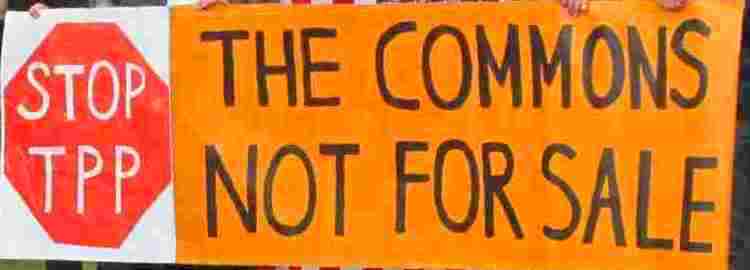 The same issue of
enforcement and jurisdiction is
present
when NATO decides to invade a country; when a private monopoly
sues under NAFTA to eliminate a national law on environmental
protection; or when laws are changed to comply with the
Trans-Pacific Partnership. Whose authority established the
supranational body, who enforces its decisions and controls them,
and whose jurisdiction is supreme are all matters of concern
which can only be dealt with if a strong political movement of
the people is built which exercises the nation's sovereignty.
Such a movement must renew the institutions, political processes
and where decision-making lies to make sure sovereignty is vested
in the people. The policies adopted by governments engaged in
nation-wrecking are not a matter of "bad policies" but of who is
taking the decisions, who they favour and who controls the
decision-making processes.
The same issue of
enforcement and jurisdiction is
present
when NATO decides to invade a country; when a private monopoly
sues under NAFTA to eliminate a national law on environmental
protection; or when laws are changed to comply with the
Trans-Pacific Partnership. Whose authority established the
supranational body, who enforces its decisions and controls them,
and whose jurisdiction is supreme are all matters of concern
which can only be dealt with if a strong political movement of
the people is built which exercises the nation's sovereignty.
Such a movement must renew the institutions, political processes
and where decision-making lies to make sure sovereignty is vested
in the people. The policies adopted by governments engaged in
nation-wrecking are not a matter of "bad policies" but of who is
taking the decisions, who they favour and who controls the
decision-making processes.
For instance, Canada has been repeatedly found to be in violation of different international obligations. In the past two years alone it has been raked over the coals by the UN Human Rights Committee and UN Committee on Economic, Social and Cultural rights for violations of workers' rights, the rights of Indigenous peoples, and at the end of February for violations of the economic, social and cultural rights of people in Canada across the board. The government does nothing but further exploit the people all the while saying it is consulting them.
Looking at those aspects of life where governments have enforced supranational state arrangements and the lack of enforcement of international covenants such as those concerning torture, indefinite detention and economic, social, cultural and political rights, shows the need to grow the people's political movement in an organized fashion.
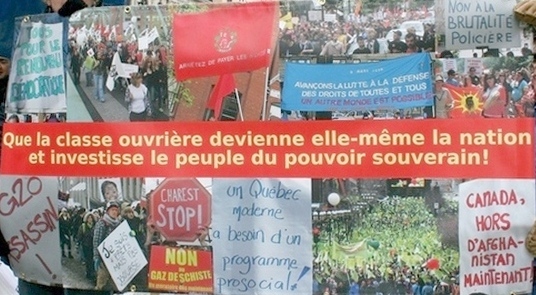 The Marxist-Leninists have
given the call for the
working
class to constitute the nation. It must do so in order to open
the door for the progress of society. This can only be achieved
when the workers take up modern definitions and work out modern
arrangements which vest sovereignty in the people. Such
arrangements will not come out of thin air. They are established
in the course of building a political movement which renews the
political processes so that decision-making is taken over by the
people. It is a matter of taking independent political stands to
affirm the human rights of the people and the political,
economic, social and cultural rights which derive from this.
The Marxist-Leninists have
given the call for the
working
class to constitute the nation. It must do so in order to open
the door for the progress of society. This can only be achieved
when the workers take up modern definitions and work out modern
arrangements which vest sovereignty in the people. Such
arrangements will not come out of thin air. They are established
in the course of building a political movement which renews the
political processes so that decision-making is taken over by the
people. It is a matter of taking independent political stands to
affirm the human rights of the people and the political,
economic, social and cultural rights which derive from this.
The working class must take the lead to ensure that the
future of Quebec, Canada and the Indigenous nations whose
territories we inhabit is not shaped by the global private
monopoly interests and their state arrangements, both national
and supranational. They are leading us and the world toward war
and economic and humanitarian disaster. This must be stopped.
Sorting out how this is done in practical terms is what builds
the alternative. It requires the kind of consciousness and
organization such as that put forward by the Marxist-Leninist
Party. This Party is at the workers' disposal to help find a way
forward. This is the kind of Party the workers need.
Notes
1. Cooper, Robert, "The Post
Modern State," Re-Ordering
the World: The long-term implications of September 11th, Edited by
Mark Leonard, Foreign Policy Centre (2002).
2. Reinisch, August. "Governance
Without Accountability?" German Yearbook of International Law,
44 (2001), 270-306, 270. Michaelsen, Christopher. International Law
in the New Age of Globalization. Boston: Martinus Nijhoff
Publishers, 2013. Pp. 11.
3. Sassen, Saskia. "Towards Post-National and Denationalized Citizenship," Handbook of Citizenship Studies. Isin, Engin F. and Turner, Bryan S., Eds. SAGE Publications Ltd, 2003.
(Based on a presentation delivered by Youth for Democratic Renewal at the Conference on the Future of Quebec organized by the Marxist-Leninist Party of Quebec in Montreal, April 10, 2016)
Website: www.cpcml.ca Email: editor@cpcml.ca
